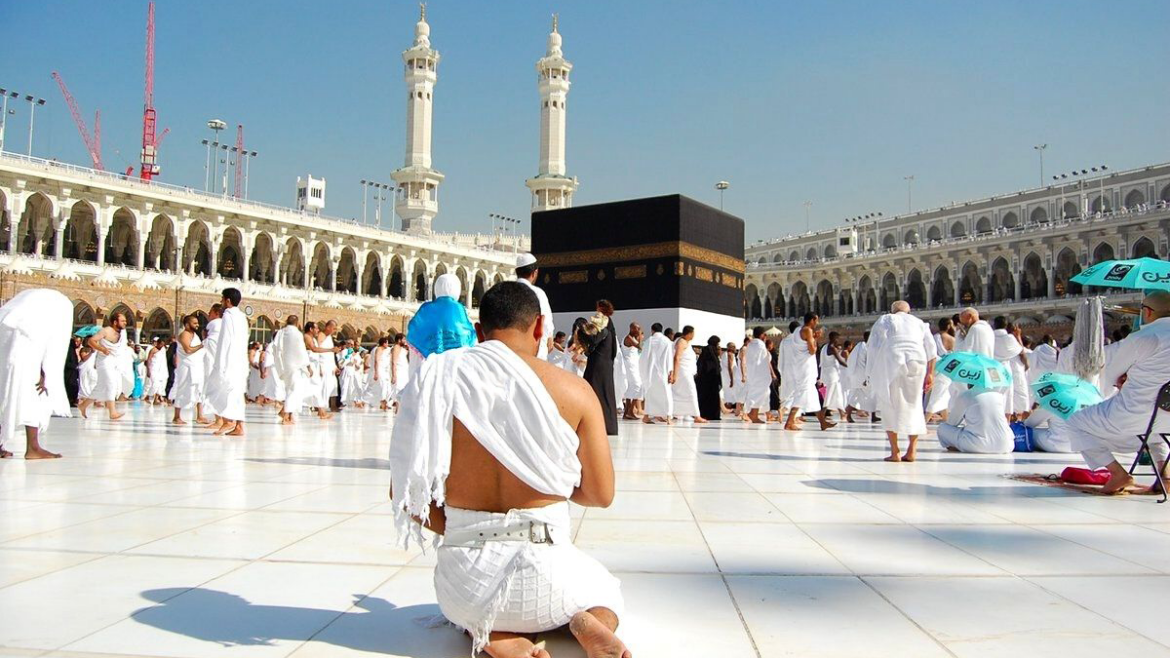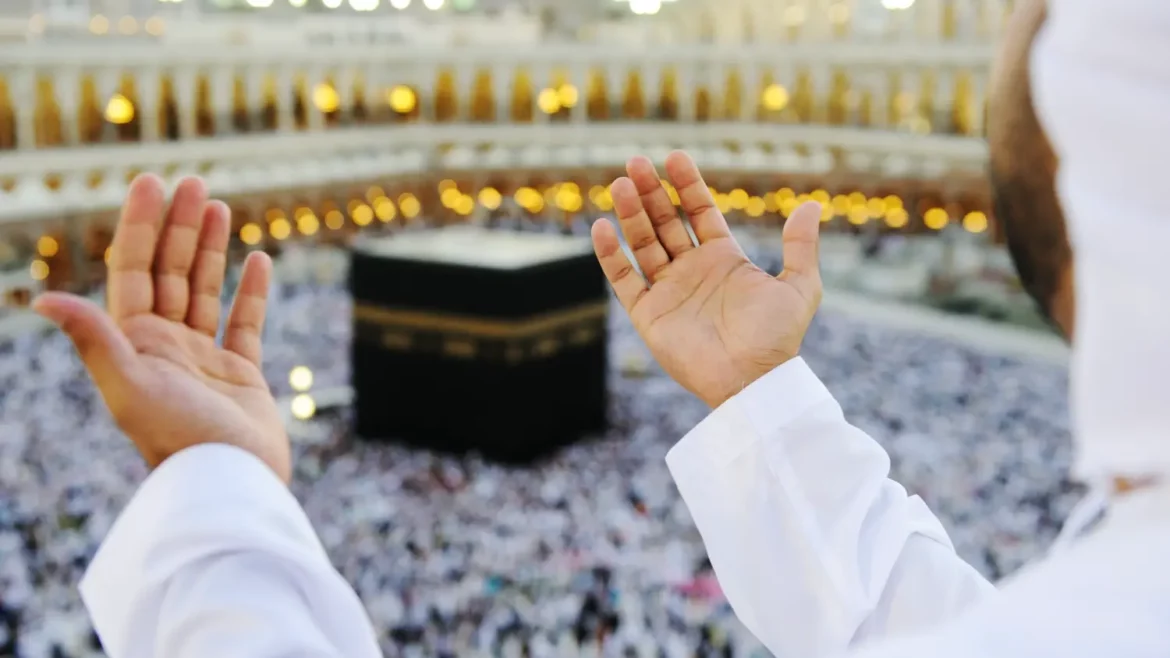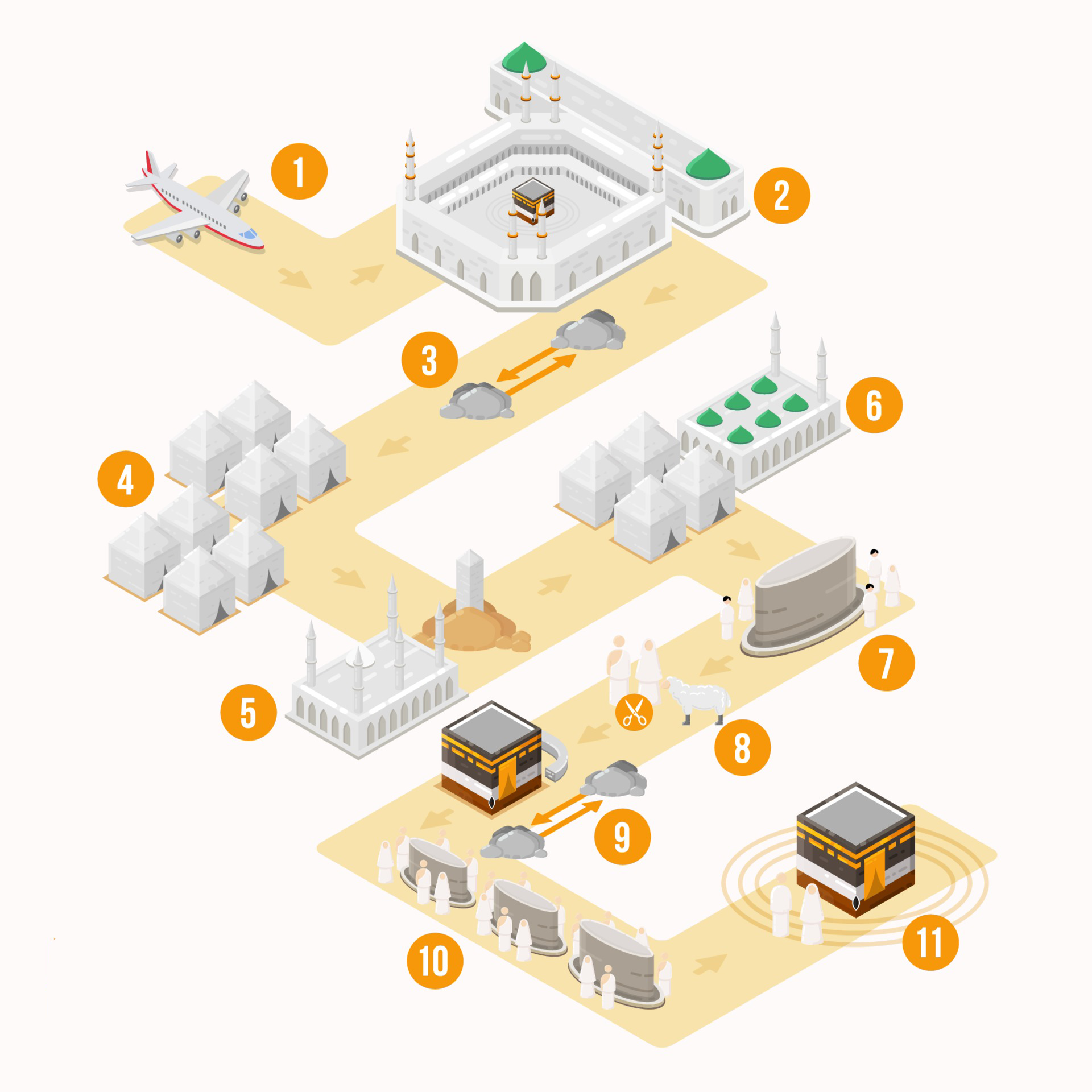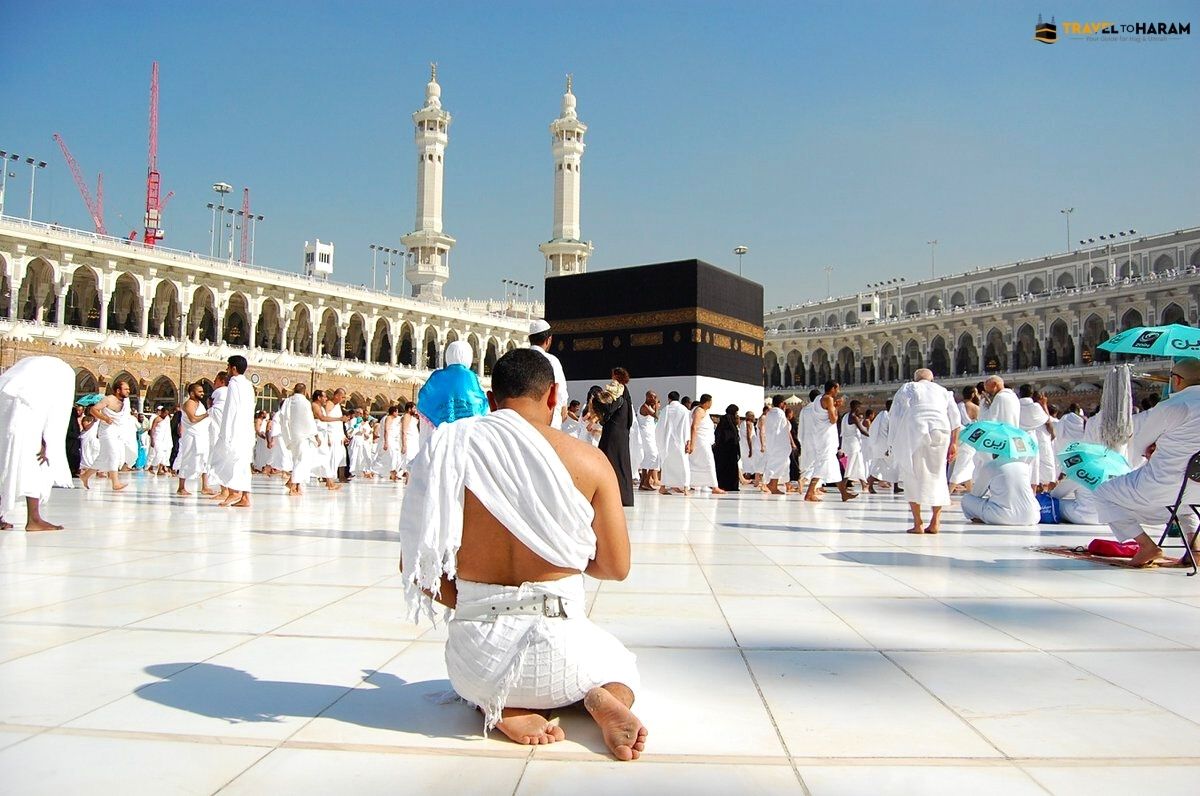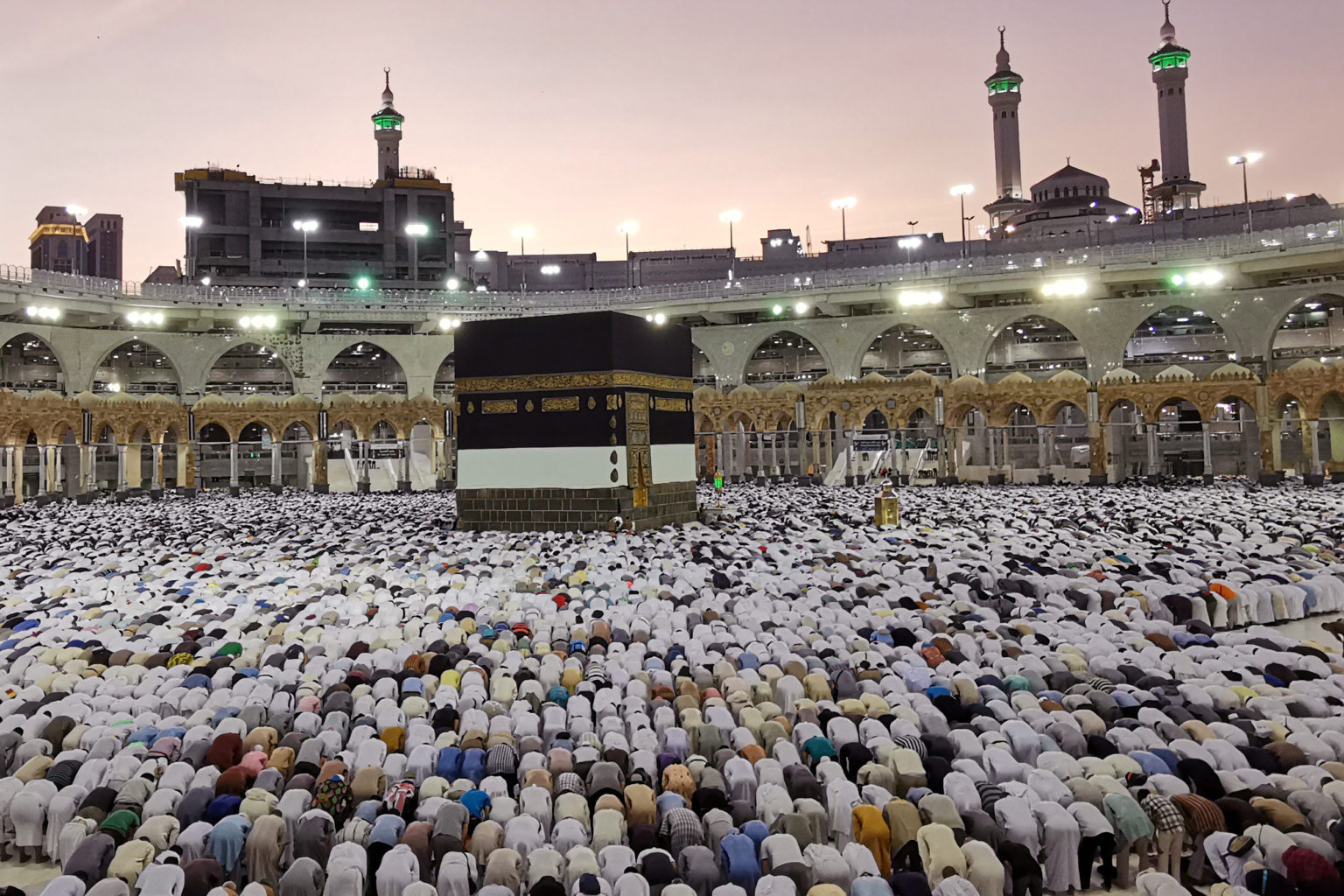Billions of our Muslim brothers and sisters around the world have been undertaking Hajj each year since 629 CE following the migration of Prophet Muhammad (SAW) from Medina to Makkah. For anyone preparing to go, it’s an incredibly exciting time but of course a deeply spiritual, serious and important period of our lives. This handy Hajj guide will help you understand the different aspects of the holy pilgrimage.
Step-by-step Hajj Guide
Subhan Allah, each and every year around 25,000 Muslims from Ireland travel to the holy cities of Makkah and Medina to perform Hajj, in unity with Muslims from all over the globe. So if you’re one of these next pilgrims heading off to Saudi Arabia to fulfil this sacred pillar, read on! We’ve put together this handy Hajj guide to help you through this blessed journey!
What are the steps of Hajj?
- Preparation and Intention
- Enter state of Ihram
- Tawaf x7
- Safa and Marwa
- Clip/Shave Hair (Umrah ends)
- Resting and Praying
- Enter state of Ihram
- Arrive at Mina
- Day of Arafah
- Muzdalifah (under the night sky)
- Rami (stoning of the devil)
- Qurbani
- Shave Head
- Tawaf al-Ifadha
- Rami (stoning of the devil)
- Spend night at Mina
- Rami (stoning of the devil)
- Farewell Tawaf al-Wida
When can I perform Hajj?
In Islam, as we work with a lunar calendar (as opposed to the Gregorian calendar), the specific dates for Hajj vary each year. Within the Islamic calendar, Hajj is performed between 8th to 12th of Dhul Hijjah – the last month of the Islamic year.
These days Hajj pilgrims travel to Makkah by air, sea, and land during the days and weeks prior to the pilgrimage period. If you’re traveling from Ireland you are likely to fly to Saudi Arabia, touching down into Jeddah or Medina. From there you will travel with your Hajj group to Makkah.
How do I perform Hajj?
There are three forms of Hajj: Tamattu, Ifraad and Qiran. For the purpose of this Hajj guide, we will use the Tamattu form of Hajj, which is what the Prophet Muhammad (SAW) encouraged his followers to perform.
Before you arrive at Makkah to start Hajj, it’s important to make your intention (niyah) within your heart. The intention must be to perform the Hajj for the sake of Allah alone, with a desire for the Hereafter. It should not be done with the intention of being seen among others or for worldly gain.
Next, you’ll enter into the state of ihram (ritual purity). For men, this means wearing the designated white cloth with one piece wrapped around your shoulder and one around your waist. Ladies can wear any clothing of their choice but should ensure they observe the rules of hijab. Face coverings, however, are not permitted. Fully-covering shoes are also not permitted. Footwear must be in the form of sandals for both men and women.
In Ihram designated white cloth
Ihram is the spiritual state you enter once you have made the intention to go to Hajj. When over three million pilgrims descend into Makkah, there should not be any outwardly distinction between pilgrims. Everyone stands equal in the eyes of Allah (SWT), whether you’re rich or poor and irrespective of ethnicity. Hence, the rules around the clothing of Ihram are extremely simple, yet strict and must be adhered to.
Throughout these holy days, we should also be particularly mindful of our behaviour and words. We should avoid smoking, engaging in sexual relations, swearing, shaving our hair and cutting our nails. We must also not use perfume or scented soaps.
Once you arrive at the holy Masjid al-Haram, in Makkah, you’re then ready to start the biggest spiritual journey of your life!
Tip: Carry a spare set of ihram if you can. As for sandals, I recommend investing in a decent pair of trekking sandals. They tend to be the most comfortable and practical, given that you will be walking long distances on tarmac as well as gravel. Try to get used to your sandals before you depart for Saudi so that you don’t break out in blisters or face discomfort once there.
Umrah
On arrival in Makkah, you will first perform your umrah, which means you will do your tawaf and sa’i.
Tawaf
Tawaf is one of the principal rites of the pilgrimage and refers to walking in circles around the Ka’bah in an anti-clockwise motion. One tawaf is made up of seven complete circuits, with each one starting and ending at the black stone.
In addition to your tawaf, you can also offer voluntary prayers to thank Allah (SWT) for arriving safely and to mark the start of this incredibly special spiritual journey.
Praying in front of the Ka’bah (Makkah)
Safa and Marwa
After you’ve performed your tawaf, you’ll then perform what’s known as sa’i – walking and running between the two hills of Safa and Marwa. You’ll begin the sa’i on Safa and walk towards Marwa until you see the green marker at which point you will run until the next green marker, and continue walking till you reach Marwa. This completes one lap. You will then return to Safa to complete your second lap. Your sa’i is complete once you have performed a total of seven laps between Safa and Marwa.
This is an important ritual in memory of Prophet Ibrahim’s wife Hajar (AS) and her struggle in the desert in search of water for her son Prophet Ismail (AS). Sa’i symbolises the ongoing struggle that we encounter throughout our lives, as Hajar (AS) experienced herself.
Once sa’i is complete, men will have their hair clipped or shaved whilst a woman clips her hair to the length of her fingertip. This marks the completion of your umrah, allowing you to leave ihram, until the 8th of Dhul Hijjah.
Tip: Be very patient here. You’ll be tired from tawaf and you might notice fellow pilgrims in a hurry to complete the sa’i. Feel free to take your time. Take regular breaks, and drink zam zam water – available between Safa and Marwa.
Day 1 : 8th Dhul Hijjah
The 8th day of Dhul Hijjah marks the beginning of the days of Hajj and the next stage of your spiritual journey. You’ll purify yourself and enter the state of ihram once again.
It’s very important to note that you are in a state of ihram and you are not permitted to smoke, swear, shave, clip your nails, or engage in any form of sexual relations. Fighting and arguments are also banned, and participants are prohibited from hunting, killing or unjustifiably breaking anything. You must also avoid scented products such as perfumes, moisturisers, makeup or soaps. You may, however, substitute them for unscented toiletries which are permissible to use.
Once you’re all set, you’ll begin reciting the following invocation called the talbiyah:
لَبَّيْكَ اللَّهُمَّ لَبَّيْكَ، لَبَّيْكَ لاَ شَرِيْكَ لَكَ لَبَّيْكَ، إِنَّ الْحَمْدَ وَالنِّعْمَةَ لَكَ وَالْمُلْكَ لاَشَرِيْكَ لَكَ
Labbayka Allāhumma labbayk. Labbayk lā shareeka laka labbayk. Inna al-ḥamda, wa n-‘imata, Laka wal mulk. Lā shareeka lak.
“Here I am, O Allah, here I am, here I am. You have no partner, here I am. Verily all praise and blessings are Yours, and all sovereignty. You have no partner.”
You will then proceed with your Hajj group to the tent city of Mina, which lies roughly eight kilometers away from Makkah.
The valley of Mina, also known as “the city of tents”
Tip: I would highly recommend carrying some essentials such as unscented sun cream, moisturiser, Vaseline and soap. Sun cream is particularly handy, especially if you have no hair like me, as it is not permissible to cover your head or face whilst in ihram. Vaseline is also particularly valuable for men to protect you from painful rashes developing as a result of constant walking. All of these are readily available in Saudi Arabia.
Mina
Once you arrive into Mina you’ll settle into your tent. Here you’ll pray dhuhr, asr, maghrib, isha and fajr, shortening your four unit prayers to two units each, without combining them, as stated in the Quran.
Spend the night and pray to Allah (SWT), read the Qur’an and prepare for day two. It’s an important time for spiritual reflection and devotion, so try and make the most of this special night.
Tip: Be patient here, as space inside tents can be very tight, and you might find yourself very close to fellow pilgrims. The weather is likely to be very hot, so remember to keep yourself hydrated. The Saudi authorities have installed cold water stations in close proximity to all tents, so familiarise yourself with your surroundings. You may also notice that Hajj authority workers regularly stock up complementary cold drinks in cooler boxes next to your tent. They’re there for you to consume, so enjoy them to quench your thirst, but don’t forget the spiritual purpose of being there.
Day 2 : 9th Dhul Hijjah
Now that you’ve performed umrah, for the rest of this blessed month, you’ll stay in Makkah to complete your spiritual journey of Hajj surrounded by your fellow Muslim brothers and sisters, SubhanAllah!
Performing Hajj:
Fulfilling your sacred obligation of Hajj will be the most spiritual period of your life insha’Allah, filled with blessings and forgiveness from Allah (SWT)!
Arafah
Gathering on Mount Arafah
After praying fajr salat in Mina, you’ll then head to the plains of Arafah, reciting istaghfar [asking for forgiveness] and making supplications, marking the Day of Arafah when we ask Allah (SWT) for forgiveness for our sins. Upon reaching the plains of Mount Arafah, pilgrims observe dhuhr and asr prayers combined and shortened (two rakat instead of four).
On this day there, will be a sermon delivered from Masjid al-Nimra on Mount Arafah. Remember to listen to the khutbah if possible. Your group may also facilitate a translation of this sermon in English.
The day of Arafah is one of the most important days for Muslims, as Allah (SWT), in Surah al-Maidah of the Holy Qur’an, refers to the Day of Arafah as the Day on which He perfected His religion, completed His favours upon His beloved Prophet Muhammad (SAW), and approved Islam as a way of life!
The Prophet (SAW) also said:
“There is no day on which Allah frees people from the Fire more so than on the day of ‘Arafah. He comes close to those (people standing on ‘Arafah), and then He reveals before His Angels saying, ‘What are these people seeking.” (Muslim)
So, be sure to stand on the plains of Arafah and make lots of du’a, focussing your energy on Allah (SWT), asking Him for forgiveness and blessings for you and your family. Don’t forget to include your friends, relatives, neighbours as well as the wider Ummah in your du’a on this special day.
Tip: Don’t be tempted to exhaust your energy and trek up Mount Arafah, also known as Jabal al-Rahmah, on this day. Jabal al-Rahmah is the hill from where Prophet Muhammad (SAW) delivered his sermon. There is no authentic source to suggest any benefit in trekking the hill itself or to undertake this climb as a religious ritual. The level area surrounding the hill is called the Plains of Arafah and this is where you should be spending your time in contemplation and prayer.
Muzdalifah
After sunset, you’ll depart Arafah and head to Muzdalifah – an open plain between Mina and Arafat. Once you reach Muzdalifah you’ll perform your maghrib and isha salah, one after the other, shortening isha salah to two rakat.
As Abdullah ibn Umar (RA) narrates:
“The Prophet (SAW) offered the maghrib and isha prayers together at Muzdalifa with a separate iqama for each of them and did not offer any optional prayer in between them or after each of them.” (Bukhari)
Afterwards, you can then spend the night in worship or resting. The Prophet (SAW) went to sleep until shortly before fajr, choosing not to engage in night worship as he normally did. So, don’t be tempted to exhaust yourself but rest instead – you have a long day ahead of you!
While in Muzdalifah, you may also collect pebbles to perform rami [the stoning of the devil] over the next three days. The size of the pebbles should be similar to the size of date stones/seeds. You will need a total of 49 pebbles. The breakdown is as follows:
- 7 for the 10th of Dhul Hijjah
- 21 for the 11th of Dhul Hijjah
- 21 for the 12th of Dhul Hijjah
However, it is advised that you pick up a further 21 pebbles as a precautionary measure to bring your total up to 70. When you proceed to the phases of throwing the pebbles at the Jamarat, you may miss the target or some pebbles may fall from your hand. Therefore, it’s better to have more than to be short. Pebbles can also be collected from anywhere in Mina.
Tip: At Muzdalifah, you will stay under the night sky. There are no tents or other accommodation facilities here. Although there are plenty of lights, it is still fairly dark. Try to stay near your group, as it is very easy to get lost amongst thousands of pilgrims. If you are a woman, ensure you stay with your husband/mahram and do not wander off on your own. Toilets and wudhu facilities are available in Muzdalifah, but they will be crowded so patience must be exercised here. I would highly recommend you to use the toilets and freshen up before you leave Arafah.
Try to carry four small pouches per person for your pebbles. I found that UK coin bags were a good size and convenient to carry. Use the four pouches to group pebbles according to the breakdown above.
Day 3 : 10th Dhul Hijjah (start of Eid al-Adha)
After performing fajr salah you will depart Muzdalifah to go towards Mina. Remember to continuously recite the talbiyah.
The 10th of Dhul Hijjah is called the Yawm al-Nahr, or the Day of Sacrifice. For pilgrims of Hajj, this is the day of pelting pebbles at one of the Jamarat, as well as sacrificing an animal. For the rest of the Muslims around the world, this is the day of Eid.
The Rami (Stoning of the Devil)
Pilgrims heading to perform ”Rami”
Stoning of the Jamara – sometimes referred to as the “Stoning of the Devil” – is a ritual carried out by Hajj pilgrims whereby pebbles are thrown at three stone structures in Mina. The act of throwing stones at the Jamarat is known as “Rami”. The ritual of Rami is symbolic of the actions of Ibrahim (AS) when he was faced with the trial of having to sacrifice his son, Ismail (AS) upon the commandment of Allah (SWT).
On the way to carry out the commandment, Shaytan repeatedly tried to change Ibrahim’s mind. As Ibrahim reached Jamarat al-Aqaba, he was instructed by Angel Jibreel to throw seven stones at Shaytan. He obliged and Shaytan fled immediately. The three Jamarat indicate the three places where Shaytan tried to dissuade Ibrahim from obeying the command of Allah. However, the pillars do not contain or hold Shaytan, as many people are led to believe.
Once you reach Jamarat, you will head to Jamarat al-Aqaba, which is the big pillar, and here you will throw the first seven pebbles at the concrete pillar. As you throw the pebbles you’ll say the takbir اللهُ أَكْبَرُ (Allāhu ‘Akbar): “Allah is The Greatest” upon each throw.
Tip: Don’t rush to perform the Rami. The timeframe to complete your Rami is from fajr on the 10th, until fajr on the 11th, so don’t worry if you’re not able to do it in the early part of the day. The Hajj authority will, most likely, allocate a set time for your group to go and perform Rami. They do this to minimise overcrowding and the risk to pilgrims.
What’s more, try not to get angry and throw your sandals or other valuable possessions at the pillars. There is no Shaytan behind the pillar, so you’ll only lose your valuables and there is no benefit in doing so!
One of the pillars for stoning in Jamarat
Following the sacrifice, you will proceed to shave or trim your hair if you are male. The Prophet Muhammad (SAW) shaved his hair and this is preferable. A woman trims her hair by the length of a fingertip.
Now you are allowed to leave the state of ihram and wear comfortable clothing. You are also allowed to everything that was unlawful during your state of ihram, except engaging in sexual intimacy. It is sunnah to apply perfume as the Prophet Muhammad (SAW) smelt strongly of musk at this point.
Tip: Use disposable blades to shave each other’s head within your group. If that’s not possible, you’ll notice a number of barbers in Mina ready to shave your head for a price. Ensure that the barbers use new blades to avoid infection.
Tawaf al-ifadha
You will now go to Makkah to perform tawaf al-ifadha and sa’i as part of your Hajj rituals.
Tawaf al-ifada and sa’i are obligatory. You must perform them after the rami, sacrifice and shaving (or trimming) of the head. This tawaf and sa’i can be done between the 10th and 12th Dhul Hijjah.
With the completion of this tawaf and sa’i, you are then allowed to relax and do everything that was lawful before ihram, including engaging in marital relations. You will, however, return to your tents in Mina and continue with the remaining rituals of Hajj.
Tip: The tawaf area will be extremely crowded during this time. Try to use the upper levels of the Haram or the roof. You might want to do this around midnight when it tends to be quieter.
Please note: The above should, ideally, be done in the above order if possible, but there is no penalty if one precedes another.
Pilgrims performing tawaf around the Ka’bah
Eid al-Adha
The festival of Eid al-Adha, or the Feast of Sacrifice, is celebrated by Muslims who are not on pilgrimage by slaughtering animals to mark Prophet Ibrahim’s willingness to sacrifice his son Ismail (AS) upon the command of Allah (SWT).
Days 4 and 5 : 11th and 12th Dhul Hijjah
These days are known as “Ayyam al-tashreeq”, or the days of drying meat. During the time of the Prophet (SAW), pilgrims would preserve the Qurbani meat by seasoning and drying them under the sun to prevent the meat from rotting. The Prophet Muhammad (SAW) said:
“The days of tashreeq are the days of eating and drinking.” (Muslim)
You are required to stay in Mina and complete two more rami rituals on 11th and 12th Dhul Hijjah. On the afternoon of 11th Dhul Hijjah, you’ll have your 21 pebbles ready and proceed to stone the three Jamarat.
You will begin with Jamarah al-Ula (the small pillar), then Jamarah al-Wusta (the middle pillar) and finally, Jamarah al-Aqaba (the big pillar). Each one should be stoned with seven consecutive pebbles accompanied by takbeer. You will stop after the first and middle Jamrat to make du’a facing the qibla. Remember to take your spare pebbles with you in case you lose some! Once this is completed, you will return to your camp in Mina and spend the rest of the day in worship, making the most of the remaining time you have.
You will then repeat the same for the following day and stone the three Jamrat.
By this point, all your rites of Hajj should have been performed, and you should be ready to depart to Makkah. Depending on your Hajj group, you may have a few rest days in Makkah, or you may depart. In any case, before you depart Makkah you must perform the farewell tawaf.
Tawaf al-wida (the farewell tawaf)
The farewell tawaf is the last rite performed before departing from Makkah. It is wajib (obligatory) and must be performed prior to leaving the boundaries of the Haram. Omitting this tawaf, without a valid reason, is not deemed lawful in Islam. Ibn Abbas (RA) narrated:
“The people were ordered to perform the tawaf al-wida as the last thing before leaving (Makkah), except the menstruating women who were excused. “ (Bukhari)
For this tawaf, you will complete the seven laps of tawaf, perform two rakat of salah and drink zam zam water. There is no sa’i or shaving/trimming of the head after this tawaf.
Hajj Mabrook! You’ve now completed your Hajj!
For those of us unable to travel and perform Hajj, don’t lose hope! The first ten days of Dhul Hijjah are often referred to as the best ten days of the year, and a second chance to earn the mercy and forgiveness of Allah (SWT) after Ramadan.
For those of us who haven’t been able to go to Hajj this year, we should use this blessed time to complete even more righteous deeds than usual. These can include anything such as giving charity, honouring one’s parents, upholding the ties of kinship, and enjoining what is good and forbidding what is evil. It is also important to enhance our obligatory acts of worship by being mindful of our prayers and ensuring we pay our zakat on time. For those of us who have not yet completed the pilgrimage of Hajj, this is also an ideal time to make du’a that Allah (SWT) grants us the opportunity to do so soon.
Our Prophet (SAW) said:
“There are no days that are greater before Allah or in which good deeds are more beloved to Him, than these ten days, so recite a great deal of tahleel, takbeer and tahmeed during them.” (Ahmad)
Fasting and remembrance are particularly recommended.
We can also still offer a sacred sacrifice in remembrance of the struggle and dedication of Prophet Ibrahim (AS) to Allah (SWT) and support a family in need.
Give your Zakat and Sadaqah during the blessed days of Dhul Hijjah and reap the rewards of this blessed month. Don’t forget though to give your Qurbani in time for Eid!

